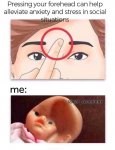Hey Everyone!
Something I've been thinking about for a long time is how many people today seem to struggle with what's been defined as social anxiety. I assume that different people experience it to different degrees, in different situations and in different ways, but I've often wondered if the digital age helps ease people into real-life social encounters, because they can "practice" online.
A quick Google search defines social anxiety disorder as "a mental health condition that causes fear and avoidance of social situations due to the fear of being judged or embarrassed."
Now, I'm pretty sure we ALL have felt this at times, but I was wondering how people feel about social interactions online vs. social interactions in person if they are especially sensitive to these issues.
* Do you consider yourself someone who struggles with social anxiety? What are your specific symptoms? Do you have them both in person and online?
* Does online communication help you feel more empowered to deal with social anxiety in person? Do you have fewer/lesser symptoms when talking online vs. talking in real life? Does "practicing" interactions online make you feel more confident to have them in person?
* What are the pros/cons of online vs. in person interactions and how does it affect your social anxiety? For example, it may seem easier to talk online, but if the conversation is just text, we don't get voice or facial cues to help us interpret a person's meaning (being sarcastic instead of serious, etc.) Do you find it more challenging to talk to someone when you can't see/read these cues?
* What advice do you have for online communities trying to help those struggling with social anxiety?
Over the years, some of the friends I've made online made me realize what a difference online communication can make to them. For some, a simple emoji reaction might mean they feel heard, which is something they've been missing in real life.
For this reason, I try to only write threads when I know I'll have some time to interact with those posting and at the very least, try to leave an emoji as acknowledgement that their post has been read. I'm not always able to do this, and if I can't find a given emoji that meets what I want to say, I tend to default to the "I(nformational)" reaction, because it lets someone know their voice has been "heard."
I know it's such a simple thing, but I never realized how it can also help people who have never been taught to believe their input matters.
What other ideas do you have for helping those who are fearful of saying anything due to being ignored, ridiculed, or rejected in real life?
Something I've been thinking about for a long time is how many people today seem to struggle with what's been defined as social anxiety. I assume that different people experience it to different degrees, in different situations and in different ways, but I've often wondered if the digital age helps ease people into real-life social encounters, because they can "practice" online.
A quick Google search defines social anxiety disorder as "a mental health condition that causes fear and avoidance of social situations due to the fear of being judged or embarrassed."
Now, I'm pretty sure we ALL have felt this at times, but I was wondering how people feel about social interactions online vs. social interactions in person if they are especially sensitive to these issues.
* Do you consider yourself someone who struggles with social anxiety? What are your specific symptoms? Do you have them both in person and online?
* Does online communication help you feel more empowered to deal with social anxiety in person? Do you have fewer/lesser symptoms when talking online vs. talking in real life? Does "practicing" interactions online make you feel more confident to have them in person?
* What are the pros/cons of online vs. in person interactions and how does it affect your social anxiety? For example, it may seem easier to talk online, but if the conversation is just text, we don't get voice or facial cues to help us interpret a person's meaning (being sarcastic instead of serious, etc.) Do you find it more challenging to talk to someone when you can't see/read these cues?
* What advice do you have for online communities trying to help those struggling with social anxiety?
Over the years, some of the friends I've made online made me realize what a difference online communication can make to them. For some, a simple emoji reaction might mean they feel heard, which is something they've been missing in real life.
For this reason, I try to only write threads when I know I'll have some time to interact with those posting and at the very least, try to leave an emoji as acknowledgement that their post has been read. I'm not always able to do this, and if I can't find a given emoji that meets what I want to say, I tend to default to the "I(nformational)" reaction, because it lets someone know their voice has been "heard."
I know it's such a simple thing, but I never realized how it can also help people who have never been taught to believe their input matters.
What other ideas do you have for helping those who are fearful of saying anything due to being ignored, ridiculed, or rejected in real life?
-
3
-
1
-
1
- Show all

